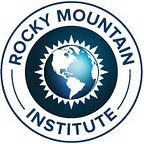A Partner’s Perspective
Mr. Dai Yande
Interviewed by Kitty Bu, Communications Director of RMI’s China Program.
Solutions Journal is pleased to have recently had the opportunity to discuss RMI’s partnership with China’s Energy Research Institute (ERI) with its deputy director, Mr. Dai Yande (far left in the photo). A Chinese think tank that’s part of the National Development and Reform Commission, Energy Research Institute is one of RMI’s partners in the Reinventing Fire: China research program.
Solutions Journal: Can you talk about how the partnership between ERI and RMI and our work on Reinventing Fire: China came about?
Mr. Dai: RMI released its famous book Reinventing Fire in 2011, and the partnership between ERI and RMI started from there. The four-year cooperation has been divided into two stages. First we jointly carried out the Reinventing Fire: China research, then we started more extensive research collaboration on issues like energy transition and climate change mitigation. ERI and RMI have also collaborated on the U.S.–China Climate Leaders Summit and the Alliance of Peaking Pioneer Cities.
SJ: What makes the collaboration with RMI and your other partners (Lawrence Berkeley National Laboratory, Energy Foundation China) unique in its ability to effect change?
Mr. Dai: Of all the research programs executed by ERI, Reinventing Fire: China, with its in-depth research, strategic origin, advanced methodologies, and global vision, was a landmark project. It not only provided critical guidance for research in energy efficiency and renewables transition in China, but also involved innovative collaboration. RMI and LBNL’s China Energy Group were technical partners for research, while the China Sustainable Energy Program of Energy Foundation China played an important role in providing financial support and coordinating and promoting new ideas. As an independent, nonpolitical, nonprofit think tank, RMI provided advanced knowledge in energy efficiency and renewables. Furthermore, RMI strived to understand China and how to adapt technology to the specific conditions of China.
SJ: The government sought views from many stakeholders in formulating China’s 13th Five-Year Plan. Was RMI one of the stakeholder groups?
Mr. Dai: The innovative ideas, methodologies, and main conclusions of the Reinventing Fire: China program have been widely acknowledged and actively spread by the steering committee composed of decision makers, managers, and senior consulting experts.
The program provided essential decision-making evidence for China in tackling climate change, achieving a clean energy revolution, and formulating the 13th Five-Year Plan and followup development plans. RMI is a very important technical partner in the process.
SJ: Why should people who provide financial support to RMI care about the work we’re doing together in China?
Mr. Dai: The cooperation between RMI and ERI deserves extensive attention from all sides.
Climate change is a global challenge faced by all human beings. China and the United States are major leaders in mitigating global climate change. As the largest developing country in the world, China’s low-carbon development strategy is not only critical for China itself, but also as a guide for other developing countries.
SJ: What are you most proud of having already achieved with the Reinventing Fire: China effort?
Mr. Dai: Many things. First, I’m proud of how the program is the joint outcome of several leading international organizations. Second, the findings will not only assist China in tackling regional pollution, but also contribute to economic development. Third, the program was based on a solid theoretical foundation, utilized scientific methodologies, and was analyzed technically and economically to prove its benefits. Finally, the findings can inject new energy into the prosperous development of China’s economy.
SJ: What would you say to other countries wishing to embark on a similar project with RMI?
Mr. Dai: RMI has a unique advantage for being not only a world-class think tank in the energy field, but also a “do tank” in the areas of energy efficiency, clean energy, and low-carbon development. RMI is a very sincere partner, which would devote all its strength and resources to a partnership.
Thanks to its enormous accomplishments and influence, RMI brings not only innovative ideas, but also various resources such as partners in different fields, successful case studies, etc. Other countries or regions that cooperate with RMI would definitely benefit significantly.
